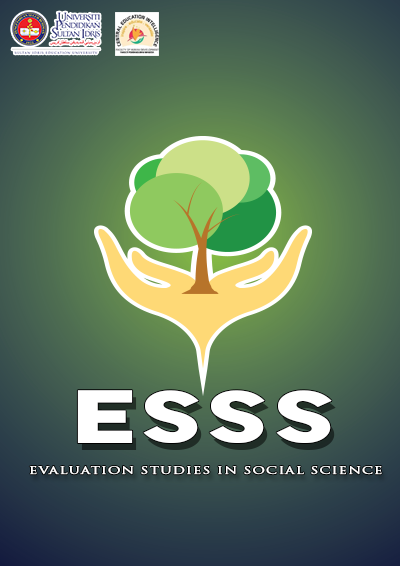Exploring the Critical Factor towards Positive Quality of Life among Breast Cancer Survivors
DOI:
https://doi.org/10.37134/esss.vol2.1.5.2021Keywords:
Breast cancer, survivors, critical factor, quality of lifeAbstract
Breast cancer had become one of the most common disease among female in Malaysia. Hence this study was proposed to explore the factor towards positive quality of life among breast cancer survivors as the issue raised due to the increasing population of breast cancer survivors. In this qualitative study of phenamonolgical design, nine breast cancer survivors who attend the informal MAKNA meeting at Social Work Department, Taiping Hospital were recruited by using purposive sampling method. The raw data obtained in face-to-face interviews carried out in individual setting with several semi structured question as a guidance were then analysed by using thematic analysis method. There are five theme emerged which are spiritual belief, optimism and positive thinking, awareness, lifestyle and pleasurable activities. Optimism and positive thinking was most frequently mentioned by the informants followed by the spiritual belief. Almost all the informants had mentioned that spiritual belief and optimism and positive thinking allowed them to have faith while going through their treatment and recover from the threat of breast cancer physically and psychologically. As most of the research with related topic conducted in Malaysia were done with quantitative method, the finding of this qualitative study is expected to provide a broad direction for the further study in this topic. Besides, the findings of this study will be able to provide preliminary information to the others breast cancer survivors on how to cope with cancer. Hence, better adjustment with the illness towards positive quality of life will be achieved.
Downloads
References
Braun, V., & Clarke, V. (2014). What can “thematic analysis” offer health and wellbeing researchers?. International journal of qualitative studies on health and well-being, 9. https://doi.org/10.3402/qhw.v9.26152
Bray, F., Ferlay, J., Soerjomataram, I., Siegel, R. L., Torre, L. A., &Jemal, A. (2018). Global cancer statistics 2018: GLOBOCAN estimates of incidence and mortality worldwide for 36 cancers in 185 countries. CA: a cancer journal for clinicians, 68(6), 394-424. http://dx.doi.org/10.3322/caac.21492
Burke, S., Wurz, A., Bradshaw, A., Saunders, S., West, M. A., & Brunet, J. (2017). Physical activity and quality of life in Cancer survivors: a meta-synthesis of qualitative research. Cancers, 9(5), 53. https://doi.org/10.3390/cancers9050053
Drageset, S., Lindstrøm, T. C., & Underlid, K. (2016). “I just have to move on”: Women's coping experiences and reflections following their first year after primary breast cancer surgery. European Journal of Oncology Nursing, 21, 205-211. http://dx.doi.org/10.1016/j.ejon.2015.10.005
Edward, K. L., Chipman, M., Giandinoto, J. A., & Robinson, K. (2019). Quality of life and personal resilience in the first two years after breast cancer diagnosis: systematic integrative review. British Journal of Nursing, 28(10), S4-S14. http://dx.doi.org/10.12968/bjon.2019.28.10.S4
Fearon, D., Hughes, S., & Brearley, S. G. (2019). Experiences of breast cancer in Arab countries. A thematic synthesis. Quality of Life Research, 1-12. http://dx.doi.org/10.1007/s11136-019-02328-0
Grimmett, A. L. (2016). The Experience of Survivorship: Quality of Life for African American Breast Cancer Survivors. https://scholarworks.waldenu.edu/dissertations/3098
Husebø, A., &Husebø, T. (2017). Quality of life and breast cancer: how can mind–body exercise therapies help? An overview study. Sports, 5(4), 79. http://dx.doi.org/10.3390/sports5040079
Lee Mortensen, G., Madsen, I. B., Krogsgaard, R., & Ejlertsen, B. (2018). Quality of life and care needs in women with estrogen positive metastatic breast cancer: A qualitative study. Acta Oncologica, 57(1), 146-151. http://dx.doi.org/10.1080/0284186X.2017.1406141
Levine, E. G., Yoo, G. J., & Aviv, C. (2017). Predictors of quality of life among ethnically diverse breast cancer survivors. Applied research in quality of life, 12(1), 1-16. http://dx.doi.org/10.1007/s11482-016-9447-x
Nock, N. L., Owusu, C., Flocke, S., Krejci, S. A., Kullman, E. L., Austin, K., ...&Vargo, M. (2015). A community-based exercise and support group program improves quality of life in African-American breast cancer survivors: a quantitative and qualitative analysis. International journal of sports and exercise medicine, 1(3). http://dx.doi.org/10.23937/2469-5718/1510020
Sadler-Gerhardt, C., Reynolds, C., Britton, P., & Kruse, S. (2010). Women breast cancer survivors: Stories of change and meaning. Journal of Mental Health Counseling, 32(3), 265-282. http://dx.doi.org/10.17744/mehc.32.3.q14777j84kx3285x
Samuel, C. A., Pinheiro, L. C., Reeder-Hayes, K. E., Walker, J. S., Corbie-Smith, G., Fashaw, S. A., ... & Wheeler, S. B. (2016). To be young, Black, and living with breast cancer: a systematic review of health-related quality of life in young Black breast cancer survivors. Breast cancer research and treatment, 160(1), 1-15. http://dx.doi.org/10.1007/s10549-016-3963-0
Sterba, K. R., Burris, J. L., Heiney, S. P., Ruppel, M. B., Ford, M. E., &Zapka, J. (2014). “We both just trusted and leaned on the Lord”: a qualitative study of religiousness and spirituality among African American breast cancer survivors and their caregivers. Quality of Life Research, 23(7), 1909-1920. http://dx.doi.org/10.1007/s11136-014-0654-3
Von Ah, D., Habermann, B., Carpenter, J. S., & Schneider, B. L. (2013). Impact of perceived cognitive impairment in breast cancer survivors. European Journal of Oncology Nursing, 17(2), 236-241. http://dx.doi.org/10.1016/j.ejon.2012.06.002
Williams, F., &Jeanetta, S. C. (2016). Lived experiences of breast cancer survivors after diagnosis, treatment and beyond: qualitative study. Health expectations, 19(3), 631-642. http://dx.doi.org/10.1111/hex.12372
World Health Organization (2019), Estimated Number of New Cancer Cases in 2018, Malaysia. Retrieved from https://gco.iarc.fr/today/data/factsheets/populations/458-malaysia-fact-sheets.pdf
World Health Organization. Division of Mental Health. (1996). WHOQOL-BREF: Introduction, administration, scoring and generic version of the assessment: field trial version, December 1996. World Health Organization. http://www.who.int/iris/handle/10665/63529





